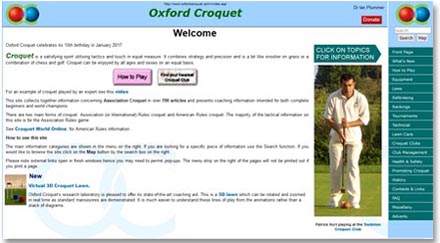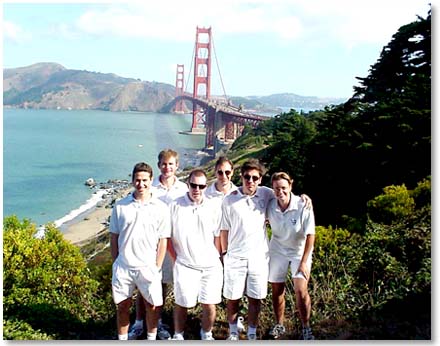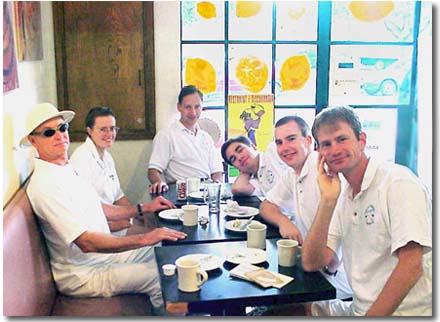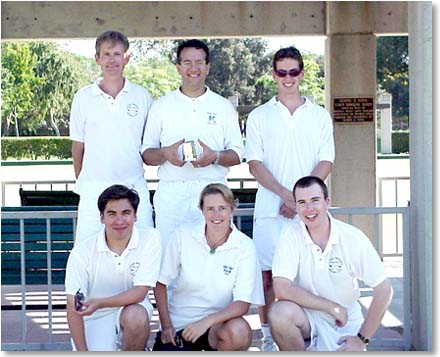

|
Back to |
| The Front Page |
| Letters & Opinion |
|
Reviewing OxfordCroquet.com by Mike Orgill Illustrations courtesy of Dr. Ian Plummer posted February 26, 2015
|
||||||||
|
||||||||
OxfordCroquet.com is a massively comprehensive piece of web design which includes almost everything one would need or want to know about Association Croquet.
Now celebrating its fifteenth birthday, OxfordCroquet.com is managed entirely by its creator, Dr. Ian Plummer, an Oxford academic who studied chemistry and received a DPhil (Oxford PhD) for designing and developing a new form of electron microscope.

|
| Despite its retro, early 21st Century look, the site is easy to navigate. |
He was on the staff of Corpus Christi and St Anne’s colleges before returning to Balliol College, from which he retired in 2014. He has played croquet since the early 1980s, has coached Oxford students for three decades, and was elected a life member of the Oxford University Croquet Club in 2013. He is also associated with the eponymous "Plummer" measure of lawn speed.
 "I came to croquet by accident; one of the students in my laboratory was secretary of the Oxford University Croquet Club and I helped him use the new-fangled 'word processor' we had in the lab to type out the Club's minutes. Other than that I had only thwacked balls in the college quadrangle without any idea of the game. It was some surprise consequently when I found that I had been 'elected' to be the secretary of the Club for the following year. ‘But I don't know how to play and I'm not a member!’
"I came to croquet by accident; one of the students in my laboratory was secretary of the Oxford University Croquet Club and I helped him use the new-fangled 'word processor' we had in the lab to type out the Club's minutes. Other than that I had only thwacked balls in the college quadrangle without any idea of the game. It was some surprise consequently when I found that I had been 'elected' to be the secretary of the Club for the following year. ‘But I don't know how to play and I'm not a member!’
From that start however I have not looked back. Of the sports I’ve tried, croquet always had a new challenge--and still does. Unlike 'target' sports (archery, shooting, etc.) where you do the same thing but become more accurate (normally asymptotically), or a team sport (rowing) where your good (or bad) input gets 'averaged' (probably to the lowest common denominator), croquet always has a new summit to be reached by your own efforts.”
|
Dr. Plummer is a qualified Croquet Association referee, a grade 3 coach, and a member of the English Croquet Association (CA) equipment committee. Thanks in large part to Dr. Plummer, Oxford University has become the foremost developer of croquet talent in the world.
"The one innovation of which I am particularly proud," Dr. Plummer told Croquet World, "is the 3D Virtual Lawn. I think this breaks new ground on the instruction of complex croquet maneuvers. No more dancing diagrams!"
Once the beginner lessons are absorbed you may dive more deeply into the weeds, studying topics such as tactics, handicap etiquette, "Which Ball to Hit?", "How Not to Play Croquet" (a comprehensive treatment and warning against Aunt Emma tactics), as well as more arcane topics such as croquet lessons written in Japanese or a German-language training handbook.

|
| Ian Plummer led his Oxford University croquet group on several overseas tours, including one to California in 2000. The photographer took the group to an ideal overlook slightly south of the Golden Gate Bridge--a cliff top above the beach, showing the headlands across the strait and the southern coast of Marin County, with little sign of human habitation except for the bridge traffic. Jonny Willson, Ian Plummer, John Taylor, Mark Wormald, Nic Farhi, Jenny Clarke (nee Williams). Photographer: Bob Alman. |
What is the best way to use OxfordCroquet.com? It depends on whether you are an innocent looking to learn about croquet, a novice looking to improve his game, an intermediate player looking to enter the top ranks, or an expert seeking to hone your game.
Curious about croquet and have never played the game? Go to the home page and click on the large clunky button labeled "How To Play." You will be taken to a page with an almost overwhelming number of links to sub-pages. There are lessons for beginners, intermediates, and experts.
|
“As a beginner there is a thrill in making a small break through a few hoops, then getting the skills to perhaps go 'all the way around'. Slowly the balance of touch and tactics is revealed; there are days when everything goes right and you can hit anything, so tactical considerations are secondary. Other days the mallet may as well be a wet stick of rhubarb and you have to depend on tactics. If I had to sum up my performance I would say that I am one of the worst shots for someone of my handicap!”
– Dr. Ian Plummer |

|
| The group shared an inexpensive breakfast within walking distance of Bob's San Francisco apartment and their youth hostel at Fort Mason. Jonny Willson took this photo of Bob Alman, Jenny Clarke/Williams, Mark Wormald, Nic Farhi, John Taylor, and Dr. Plummer. |
For the intermediate (handicap 16 to 4), there is an extensive series of 16 lessons taking the player all the way up to an introduction to the triple peel. The intermediate can then delve into articles on Practice Routines, Getting Boundary Balls Into Play, Sweep Shots, Cannons, The Mental Approach, etc. Have you heard of the croquet handbooks written by John Riches? Download them all for free from the site.
And then there is advanced level material. No lessons here, but a raft of articles on many aspects of the advanced game, such as peeling, popping, bombarding, third-turn four-back leaves, pegged out endgames, and an excellent article on "How To Beat Better Players", and on and on.
How about a trip into the stratosphere? There's a section on Super Advanced Play.
|
“Croquet is a pleasing intellectual challenge. Some of the more fancy manoeuvres (e.g. triple peels) are complex acts of horizontal juggling. Then there is the fact that you have to 'play the person'. There is the delight of executing a daring and complex break, or leaving the opponent with a do-or-die scenario at the end of your break. I get much more pleasure from playing well rather than winning. Playing a crisply executed break and losing is more satisfying for me than scraping a win by luck.” – Dr. Ian Plummer |
Links to all of this valuable material are contained on a single page of the site. To get an impression of the completeness and complexity of OxfordCroquet.com, go to the site map at the upper righthand corner of the home page. There you will find six pages of links covering many aspects of Association Croquet, including many you will not realize you needed to know before you perused the list. To sample the most arcane, go to a "Health and Safety" page that lists all the health and safety ramifications of playing croquet at a club, from the most benign (actually playing the game) to the most dangerous (lifting heavy objects, perhaps after one too many stiff drinks?).
Do you wish to find a croquet club in your area? Click on "Clubs – Club Listing by Country" and you will find a world map with hundreds of clubs precisely located.
Seeking information on mallets and mallet purchases? Just go to the Equipment section where a thoroughgoing treatise on mallets is available, along with a list of world manufacturers and their contact information.
Interested in delving into the technical aspects of croquet? Click on the Technical section and gaze upon a hoard of geekish croquet knowledge. Learn the physics of croquet, how to measure accuracy in croquet, and other seldom-addressed topics.
Concerned about missing too many roquets? Study "Mallets: End-Weighting and the Moment of Inertia" and find out why.
Suddenly finding yourself interested in the ins and outs of refereeing? Study the refereeing section, with its articles on Refereeing Practice, Refereeing Problems, and a section on Refereeing Practice developed by Bob Kroeger and Ted Prentis.
|
“I get a huge amount of pleasure from introducing people to the sport and have recently been delighted to find people I taught 20 years ago returning to croquet now that their lives and careers have settled. It was a delight in the 2013 World Championships to realise that I had coached 10% of the players there — eight of the field of 80.”
|

|
| Dr. Mohammad Kamal hosted the group in the second half of their tour, to Southern California, which included play on the Beverly Hills Croquet Club courts. Mark Wormald took this picture of Ian Plummer, Mohamed Kamal, Jonny Willson, Nic Farhi, Jenny Clarke/Williams, and John Taylor courtside in Beverly Hills. |
OxfordCroquet.com has much more, with sections on Lawn Management, Laws, an extensive section on Rankings, Tournaments, History, Promoting Croquet, Club Management, etc. The sweep and depth of the information it displays is impressive and definitive. And even though in terms of web design the site has a early 21st century retro look, it is easy to navigate.
Dr. Ian Plummer's site is a masterwork, the go-to site for Association Laws croquet.
|
MAJOR CROQUET WEBSITES
In addition to the sites of the national associations--linked to from the WORLD CROQUET FEDERATION website a few others perform unique roles in the sport: OXFORD CROQUET has assumed encyclopedic volume since it was introduced in 2002 as the go-to resource for technical information of all kinds, from equipment and grounds to tournament management, coaching, tactics, and strategy. CROQUET RECORDS AND RANKINGS was created and is maintained by Chris Williams, the English Croquet Association's "Ranking Officer." Data on major player and team events dating back to the 19th Century compiled from individual game statistics and continuously updated can be configured in an array of statistical comparisons of countries, players, triple peels, winning percentages, and even head-to-head comparisons of records. CROQUET SCORES allows tournament managers to directly input Association Croquet and Golf Croquet results wherever and whenever competitive events are happening. it also allows "real time" commentaries on events which can be started and conducted by anyone. Players all over the world have come to rely on the site, which is being continually developed and improved. CROQUET NETWORK is produced by Dylan Goodwin, who also publishes the United States Croquet Association's tri-annual magazine, and provides tournament coverage in addition to weekly links from croquet news sources across the world. CROQUET WORLD ONLINE is the global, independent magazine edited and written with site-generated articles to represent the sport to the broader public as well as to players, and to announce and report on major events anywhere as they happen.
|
| Back to Top | Copyright © 1996-2023 Croquet World Online Magazine. All rights reserved. |